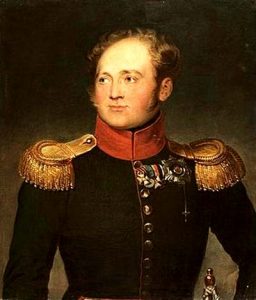(1801 – 1825)

Alexander I Pavlovich, the eldest son of Paul I and Empress Maria Feodorovna, ascended the throne. He was born on December 12, 1777, was married to the Princess of Baden Luisa, who was called at the chrismation of Elizaveta Alexeyevna.
In the manifesto, promulgated on the day of his accession to the throne, Alexander promised to rule the state according to the laws and the heart of his grandmother, Catherine II.
At the beginning of the reign, the University of Dorpat was transformed.
In 1803, the decree on free grain farmers, according to which landowners were allowed to release whole villages to freedom.
Universities in Kazan and Kharkov and engineering school are founded.
A censorship statute was issued, which softened the severe laws on the press.
In 1811 the Tsarskoye Selo Lyceum was founded.
In 1819 the University was founded in St. Petersburg.
Remarkable companion of Emperor Alexander I was Speransky, to whom the Emperor passed various projects of state reforms and often spent whole evenings with him in talks on these issues.
In 1809, Speransky presented to the sovereign a draft of a general and fundamental reform, which was to concern all aspects of the state system. The Sovereign approved the project, but only those parts of the project that concerned central management were implemented.
In 1810 the reorganized State Council was opened, which acquired a legislative character. All new laws were to be discussed in the State Council, and then go to the government for approval.
In 1811 the ministries were transformed.
In 1808, the war with Sweden due to Sweden’s refusal to join the alliance of the northern powers against England. The war ended in the Friedrichsgam world, in which Russia acquired Finland to the River Torneo and the Åland Islands.
From 1806 to 1812, the war with Turkey as a result of its violation of certain articles of the peace treaty. The war ended in the Bucharest world, in which Russia received the Bessarabian region.
In alliance with other states, Russia waged war with Napoleon.
In 1805, under the command of Kutuzov, an army was sent to help Austria. The Allied army was defeated at Austerlitz.
In 1806, Russia acted in Prussia, but failed. Alexander made peace with Napoleon in Tilsit in 1807.
In 1812 – the Patriotic War. The reason was the non-compliance of Napoleon with the conditions of the Peace of Tilsit. The commander-in-chief was appointed Kutuzov, who on August 26, 1812, gave battle at Borodino.
The war did not end with the expulsion of the French from Russia, Alexander I decided to continue it and liberate Europe from the rule of Napoleon. An alliance was concluded with Prussia, and then with Austria. At Leipzig, Napoleon lost the battle.
The Allies entered Paris and restored the previous Bourbon dynasty to the throne in France in 1814.
In 1815, the conclusion of the Holy Alliance for the protection of peace in Europe.
After the Patriotic War, the transformative activities of Alexander I ceased, and a great change took place in his character. He sought consolation in religion and was burdened by the burden of government.
At that time, Arakcheyev, who built military settlements on the lands of the state peasants, enjoyed great influence.
November 12, 1825 Alexander I died in Taganrog.
History called him “Blessed.”